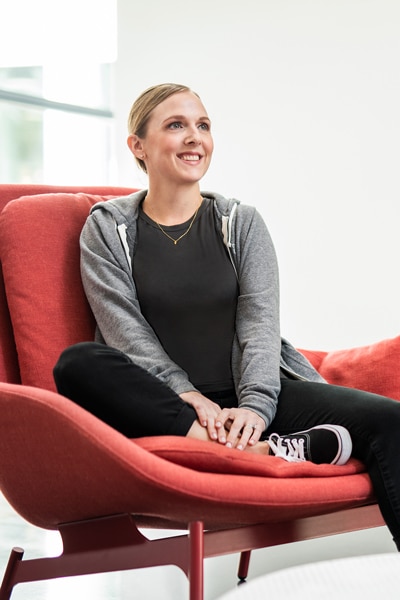When Ana Lang began her law career, she didn’t envision having to know about mixed reality headsets, add-on applications, or the cadences of over-the-air software updates. She was a transactional lawyer by training, and a corporate attorney to start.
How things can change.
In 2015, Lang joined Magic Leap, a Florida-based start-up company that recently launched its first product, the Magic Leap One Creator Edition, a lightweight, wearable computer that allows digital content to step out of the screen and into the real world. As vice president and associate general counsel of Magic Leap, her technology knowledge set is now a lot wider than it was when she graduated from law school at UC-Berkeley.

“Coming in and learning about software and how a device operates was a huge challenge for me,” she concedes. “I was surprised by the level of in-depth requirements from a knowledge perspective. When you work here, you become a brand ambassador.”
Although knowing the ins and outs of the company one works for is a pretty standard M.O. for employees—let alone company executives—Lang says everyone in the legal department must have an almost innate understanding of Magic Leap’s technology and product road map, like its devices, the apps and content available, key third-party business relationships, and overall specifications for the product’s optimal use. All handy things to know from a legal perspective, but also required knowledge to solidify the culture of a legal team at a company that’s still realizing its full potential.
Magic Leap has come a long way from its comic book roots, but it is only at the beginning of its story and the story of mixed reality computing. Lang believes a company that pursues new horizons has to be on the same page in every department, and legal cannot afford to be out of step with any new development.
“I expect my team to speak the same language as our business folks and be familiar with the terminology Magic Leap uses for its products and services,” she says. “Demonstrating knowledge shows you have an interest in what other people are doing. It’s about collaboration. When the lawyers understand more than paperwork and legal issues, it nurtures an environment where everyone is open to asking questions and deeper understanding.”
In other words, it’s about fostering a culture of “fearless curiosity.” Although legal departments at some companies have a reputation—however unfair it might be—of being places where good ideas go to die, Lang says she works every day to destroy that stereotype and establish the legal department as a place where creative solutions are provided for questions that anyone at the company might have.
“I don’t want my team to be the team that tells the business that they can’t—I want them to tell the business how they can,” she says. “Sometimes, how they ‘can’ is messy or complicated, but I want people to know that when we say, ‘This is how you can,’ we’re here to do it with you every step of the way.”
That spirit of unity starts within the legal department itself, where Lang says her team sits in close quarters, uses check-ins to bounce ideas off each other, and crowdsources ideas on how to solve various problems that the company might face. Besides strengthening the bonds within the team and with the other departments in the company, she points out this strategy is also a good learning tool for the more junior attorneys on staff.

“When they see people thinking outside the box to get to a respectable legal solution, it teaches them that skill, and they’re going to be able to apply that in the future,” she says.
Magic Leap is at the forefront of new technological frontiers and with that comes all the necessary paper work and headaches that you might expect with contractual provisions; marketing studies; issues about patents, copyright, and trademarks; licenses for third-party software; and a host of other issues keeping the legal team busy. Lang says looking after all that itself could be a full-time job for most legal departments, but in addition, she wants the legal team to be proactive about spotting issues, rather than purely reactive.
“When you empower employees within the company to find issues they spot online or in social media, it increases their awareness of how people are using the company’s information or materials and, in some instances, the information gathered by the employees has been the most valuable,” Lang says. “We want people to participate in that process.
“We work with marketing and business development to monitor how people are publicizing relationships with Magic Leap and to make sure they’re staying within the terms of the agreement,” she adds.
When a team has the capacity to be as transformative and flexible as the very products it produces, the sky’s the limit. Nothing less should be expected, Lang says. You just have to ask.
“Asking questions around here is not verboten,” she says. “In some more institutional cultures, asking questions might be frowned upon. Quite honestly, from my perspective, it’s required.”
Photos: C&I Studios

